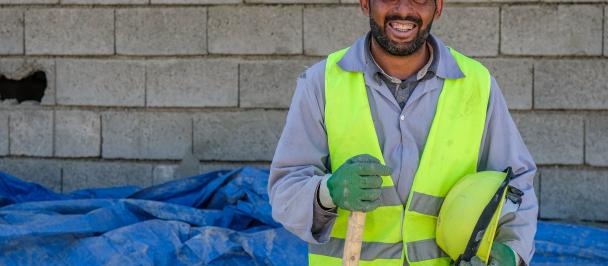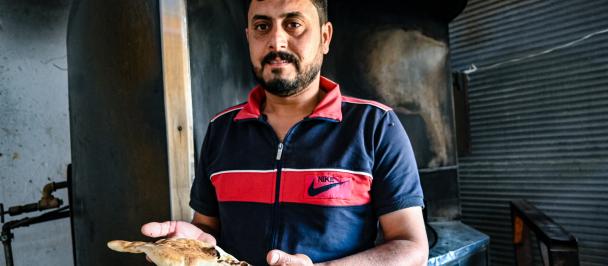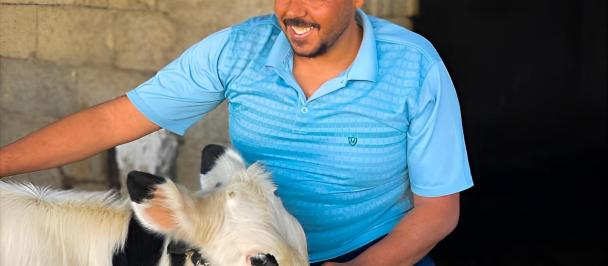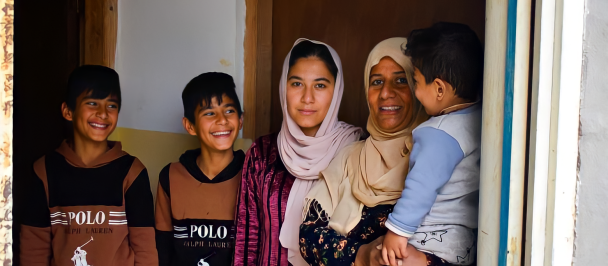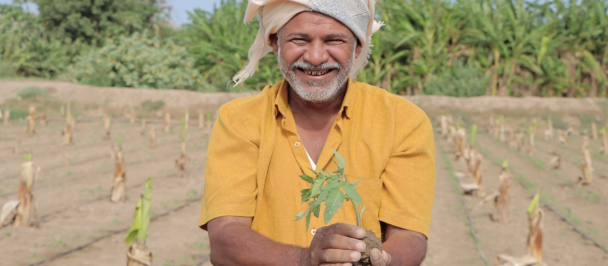Striving to earn a living
March 28, 2023
Hanan is 49 years old and a mother of four living in Bustan Al-Basha neighbourhood in Aleppo. Her husband works as a leather maker. Before the crisis, they sold their house in Bustan al-Basha and moved to the suburbs.
“Our home was damaged during the crisis, so we fled again to live in Al-Jabriya neighbourhood until 2019, then we returned to Bustan al-Basha. I rented a shop near the house and started working again; my eldest son was seventeen, while my youngest daughter was less than two years old”.
Hanan’s financial situation and the household needs prompted me to work in a sewing workshop. “I started learning from scratch and the owners of the workshop were very supportive. They appreciated the fact of me being a mother working more than twelve hours a day,” Hanan added.
Hanan takes her lunch break at home to care for her children, then she goes back to work until six in the evening. “ I learned how to make accessories and child wear ranging from hats to bags and belts. I stayed with them for five years, until 2011 when the situation in the area started to deteriorate. Power outages have become almost permanent. The workshop closed, like most of the workshops in the area, and skilled labourers began to leave”.
Work stopped for about four years, until 2015. During this period, Hanan was displaced with her family in Al-Jabriya neighbourhood. They lived in a sewing workshop. Hanan started working as a seamstress, and then after a while asked the owner of the workshop to allow her to use the sewing machines when electricity was on.
“By the end of 2018 we returned to Bustan al-Basha, where we first lived, and I rented a shop nearby to start my work here. Work was minimal, but I insisted on going on. I started networking with nearby workshops to make child wear accessories, and began to receive orders. At the beginning, I used old machines and second-hand tools, hoping to be able to buy new ones from what I earn, but the household needs and the operational costs were higher”.
Hanan applied several times for grants to support her business but with no luck. A mobile team from the United Nations Development Programme (UNDP) was conducting field visits at Bustan al-Basha. She took a chance and applied for support in an attempt to restore her livelihood. “I thought I would face the same situation as before, where I would submit my application and all requested documents, and everything would be forgotten,” Hanan said. “However, the surprise was that I was contacted to verify my details and was asked me to complete some other documents to be included on the list of project beneficiaries”.
With funding from the United Nations Central Emergency Response Fund (CERF) through the United Nations Development Programme (UNDP) in Syria, the project aims at reviving workshops in Bustan al-Basha and support businesses and professions in the area to secure sustainable livelihoods for families and communities.
The project includes the revival of 35 various workshops in Bustan al-Basha by providing the necessary support in terms of raw materials, equipment and tools that contribute to economic recovery, advancing production, providing a decent source of living for families, and encouraging the return of more residents to the neighbourhood.
The project also increases awareness among companies and beneficiaries about corporate social responsibility which contributes to economic, environmental and community development. It also develops the skills of beneficiaries to market their products, as well as raise their awareness about vocational health and safety methods and child labour.
The project is implemented in coordination with several actors on the ground including the Aleppo Chamber of Industry and the Federation of Craftsmen in addition to Bustan al-Basha neighbourhood Committee who announced the project and encouraged the return of artisans and active associations to the area.
The project provided Hanan with a stitching machine, a contour machine, and a manual stamping machine, all of which were based on her needs and upon her request. “The machines are modern and require fewer amperes. This will save some of the operational expenses, and increase the number of orders. I even started getting new customers and new workshops that wanted me to supply them with accessories,” said Hanan.
Through her business, Hanan was able to create job opportunities for three people and help them earn a living. “I can say I am one of the first women to start their business in Bustan al-Basha. I have the full support of my family and my neighbours. Many women in the neighbourhood were encouraged to work and start their own business, but their difficult circumstances and the high rent rates prevent them from doing so”.
“I thought we were saved and it was time for us to start a comfortable life again, but unfortunately my home was damaged due to the earthquake that struck the city”. The pressure of the entire building was on Hanan’s home which was on the first floor, and her workshop was damaged.
She moved to a school that was opened as a shelter and then moved again. She went to her son-in-law’s house and will is still there until her house is rehabilitated. Sh also stopped working for a few days until the situation calms down.
“All the people in the neighbourhood were affected and so have their businesses. Some of my neighbours have not worked for more than a month, but we are all still striving to earn a living”.

 Locations
Locations